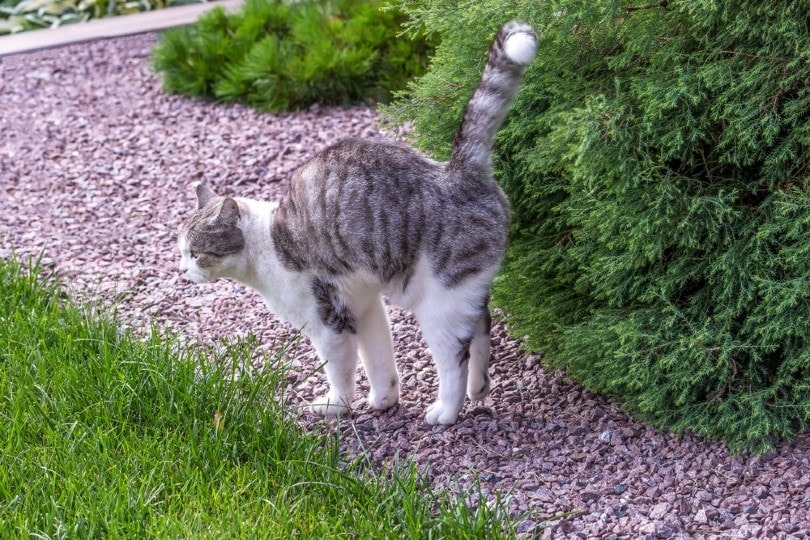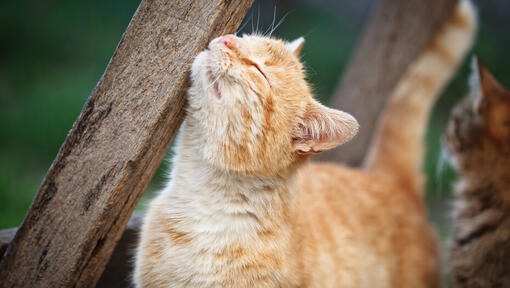Last Updated on February 13, 2024 by Fumipets
Understanding Cat Spraying: Unraveling the Mystery and Solutions
Cat spraying, a behavior where cats release small amounts of urine outside the litter box, can be both frustrating and perplexing for cat owners. This seemingly territorial act is often misunderstood, leading to strained relationships between cats and their human companions.
In this guide, we delve into the reasons behind cat spraying and explore effective ways to address and prevent this behavior, fostering a harmonious living environment for both you and your feline friend.
Cat Spraying
You see a damp patch on the sofa’s side, the draperies, or maybe running down the front door. Is that the case…? It looks and smells just like cat urine. Oh no. What exactly is going on? Is your cat attempting to communicate with you?
When your cat sprays, they’re really attempting to communicate with you (or another cat in or near your house)! “I was here”/”this is my home” or “I’m stressed out” are the most common responses.
Spraying (or “marking”) is, after all, a form of communication for cats. It’s not the same as fully peeing or pooping outside the litter box (a.k.a. “inappropriate toileting” or “inappropriate elimination”), which, although it might be caused by stress or problems between your pets, is almost always due to a problem with your cat’s litter box (e.g., the type of litter used, the location or number of boxes available, or another of the common problems with litter box setup and maintenance).
To add to the intrigue, both “spraying” and “inappropriate elimination” may be caused by or exacerbated by an underlying medical condition (e.g., arthritis, cystitis (“cystitis”) or infection (“UTI”), renal failure, diabetes, hyperthyroidism, or a variety of other conditions). This article will concentrate on assisting you with a spraying or “marking” cat. Read on to find out whether that’s your cat and what you can do about it.r
What Cat Spraying Means
Scent is one of the ways cats communicate, and they leave their odours in certain locations. Spraying, like scratching, rubbing their face on items (including you), or even rolling about on the ground, is a perfectly natural and acceptable manner for cats to “converse.”
Of course, we’re normally happy with our cats communicating by rubbing their faces on objects or rolling about on the ground in the human world, but we’re (understandably) less enthusiastic about our cats communicating by spraying pee. So, let’s look at why your cat is doing it and how you may assist them (and yourself).
Do you need assistance with your cat clawing your furnishings as well? Or maybe you’d want to understand how to prevent them from doing so in the first place?
It might be difficult to tell whether your cat is spraying or marking rather than avoiding the litter box and exhibiting “inappropriate elimination.” So, here are some indications to look for that can help you tell the difference:
In most cases, inappropriate elimination urine occurs solely on horizontal surfaces (e.g., floors, laundry, etc.). Urine that is sprayed, on the other hand, usually appears on vertical surfaces (e.g., furniture, walls, etc.).
If you catch your cat spraying or marking in real time, you’ll see that they’re standing with their back to the vertical “target” and their tail straight up. You may even see their tail trembling.
Spraying/marking cats are likely to use their litter boxes on a frequent basis for both urine and faeces.
Spraying cats almost seldom “mark” with faeces, and they almost never do it with urine.
When it comes to spraying cats, the location is usually more significant to them than the “feel” of the thing they’re spraying on. They’ll spray in locations they wish to claim as their own or where other cats will see and read their message. Inappropriately toileting cats, on the other hand, will often “do their business” on a surface other than their litter boxes, which is why this sort of behaviour frequently occurs on carpet, laundry, or other “cushy” surfaces.
If your cat is exhibiting any of these behaviours, continue reading for assistance. If you believe your cat is just avoiding the litter box, read this article on improper elimination, which will help you figure out what’s going on.

Common Reasons Why Cats Spray
Territory: Cats mark their territory in a variety of ways, including spraying, particularly if another cat is lurking nearby and leaving their own mark in your yard. Even if your cat seldom goes outdoors, there’s a chance they’ll notice or smell the “intruder” and spray around the door or window in reaction.
Conflict: Spraying may also be used to delineate borders, establish pecking orders, and resolve conflicts in multi-feline families.
Change: A cat may become anxious and nervous as a result of moving to a new location, a home renovation project, a change in habit, or the arrival or death of a human or pet sibling. It’s also not necessary for the adjustments to be significant. Even rearranging the living room furnishings might agitate a sensitive cat. Spraying is one way a worried cat expresses its distress.
Mating: Both female and male cats spray, however, unneutered males are more prone to do so to signal that they’re accessible to the opposing sex (and to mark their territory). Even if your spraying cat has been spayed or neutered, if the surgery was performed later in life, it’s possible that this is a learned habit from their prior “fertile” days.

Getting to the Bottom of the Spraying Puzzle
The first step is to get your cat spayed or neutered if it hasn’t already been done. It’s also crucial to have your veterinarian rule out any medical issues. What seems to be spraying might be an indication of urinary tract irritation or infection, bladder stones, hyperthyroidism, or any of a number of other frequent feline medical issues. Once your cat has received a clean bill of health from the doctor, attempt the following to troubleshoot and solve your cat’s spraying problem at home:
Sparkling Clean: Thanks to their 200 million smell sensors, your cat will detect even the faintest odor of pee left behind. And the odor may tempt them to return to the same location to spray again. Use an excellent enzymatic, bio-based cleanser, such as Nature’s Miracle ADVANCE Cat Stain & Odor Eliminator, to thoroughly clean all the places your cat has marked. Also, read this article for advice (as well as a warning) about cleaning up pet messes.
Calming Pheromones: Install Feliway® multi-cat soothing pheromone diffusers around your house after cleaning. Feliway multi-cat has been found to aid cats in multi-cat homes and settings minimize stress-related disorders. (Note that Feliway is occasionally offered under the “Comfort Zone” name, and the multi-cat Feliway/Comfort Zone product is distinct from the “original” Feliway/Comfort Zone product, which is designed for single-cat settings.)
Cat Away: Pull the blinds and/or move your cat’s perch to a different spot if another cat wanders into your yard and stresses your kitten out. The following suggestion is a bit of a stretch, but it’s worth a go if the tension is coming from your neighbour’s outside cat and you have a nice connection with him. Inform them that their cat’s presence in your yard is causing your cat to get stressed and urinate in your home. They could be willing to keep their cat indoors, or at the very least in their own yard (there are cat-proof fences available, including this option which, although a little pricey is highly effective for most cats). Consider a compassionate outdoor animal repellent like the Hoont Cobra Jet Spray if it isn’t your neighbour’s cat, or if it is but they won’t keep their cat inside or put up cat-proof fence.
Environmental Enrichment: Maintaining your cat’s physical and mental activity will aid in their overall well-being and stress reduction. They’ll be kept occupied and satisfied with training, engaging toys, food puzzles, and lots of vertical perches and quiet hiding spots.
Boxes and Bowls: In a multi-cat household, make sure there’s a litter box for each cat plus an additional one, as well as litter boxes in separate regions and floors of your home to avoid fights. Separate feeding places and individual food bowls for each cat may also assist to minimize confrontations.
Supplements: The VetriScience Composure chews are worth considering since they may help relax and decrease tension in cats in specific conditions. Other supplements that may assist might be discussed and recommended by your veterinarian. (At the conclusion of this post, there’s a note regarding meds your vet may give that can assist, as well.)
If Your Cat Is a “High Pee-er”: If your cat merely pees on the floor but not in the litter box, you may want to consider using boxes with higher edges to prevent the problem. The crucial thing is that one side is still low enough for your cat to enter. Getting a cat into and out of their litter box, especially as they become older, may bring a whole new set of issues and a lot of suffering (as many cats over 7 years old have arthritis).
You could also use covered boxes, but you’ll need to scoop them at least once a day since they’re more likely to hold ammonia and other odours that irritate your cat’s nose/lungs and drive them out of the boxes.

What You Should Not Do
Negative reinforcement, such as yelling at your cat, will not assist the issue – in fact, it will likely aggravate it since your cat will become more agitated.
Deterrent sprays (especially water sprays) might make your cat uneasy and stress them out. Even if the spray prevents them from marking that specific site, they will most likely go on and mark another location.
While owning a cat that sprays in the home might be aggravating, try not to take it personally! Your cat isn’t angry with you; they’re only informing you that they’re feeling intimidated or uneasy. If you and your veterinarian have ruled out an underlying medical condition and you’ve tried some of the DIY options above and are still having trouble managing the problem, you should see your veterinarian or a board-certified veterinary behaviourist.
It’s also a good idea to do it sooner rather than later. They may not only provide you more specific advice for your cat and environment, but they can also prescribe drugs that have been demonstrated to aid spraying cats.
Q&A: Cat Spraying – Causes and Solutions
Why do cats spray?
Cats spray for various reasons, including marking territory, expressing stress, or signaling their presence to other cats. Hormonal changes, health issues, or environmental stressors can also contribute.
How can I tell if my cat is spraying or just having litter box issues?
Cat spraying typically involves small amounts of urine on vertical surfaces like walls or furniture. If you notice this behavior, along with signs of distress, it may indicate spraying rather than litter box aversion.
Can spraying be a sign of a medical issue?
Yes, medical issues like urinary tract infections or kidney problems can cause spraying. If the behavior is sudden or accompanied by other unusual symptoms, a visit to the vet is recommended.
How can I prevent my cat from spraying inside the house?
Maintain a clean litter box, address any environmental stressors, provide vertical spaces for territorial marking, and consider using pheromone diffusers. Neutering or spaying can also reduce spraying in some cats.
Is punishment effective in stopping cat spraying?
No, punishment can exacerbate stress and worsen the spraying behavior. Positive reinforcement, creating a cat-friendly environment, and addressing the underlying causes are more effective approaches.


















